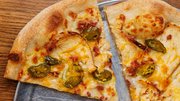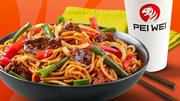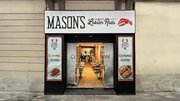Article
Don't Bogart that sub
The CEO of Cheba Hut shares the brand's marketing techniques, growth plans and just what's in those Hemp Brownies.

November 4, 2013 by Cherryh Cansler — Editor, FastCasual.com
The nation's views on marijuana weren't nearly as liberal as they are today when the first Cheba Hut "Toasted" Subs opened in 1998, so opening a weed-themed sandwich shop was a bit risky. Scott Jennings, president and CEO, wasn't worried, however.
"Most people get that we are all about our food and experience, and the theme is just a bonus. We are competing in a very saturated market with a lot of big players. If it was a gimmick, we would have been dead in the water 15 years ago," he said. "We take a playful approach to our marketing, but we take our customers and our business seriously."
The chain did more than $10 million last year with its 16 units throughout New Mexico, Arizona, Chicago, Iowa, Oregon and Colorado. Jennings is shooting for $12.5 million in sales for 2014, with the addition of three to five locations, including two in the next six months in San Diego. And even though pot is now legal in Colorado, Jennings said the chain is going to stick to sandwiches.
"Our business has always been rooted in high-quality food," he said. "We believe in doing one thing and doing that thing well. From a consistency standpoint for our operators and our customers, we'll keep our focus on food and experiences."
Every Cheba does sell Hemp Brownies, however, and they are 100-percent legal. They have hemp nut seeds but contain no THC.
Honing the experience
The customer experience is a big part of Cheba's success; customers come not only for a great sandwich but also because they love the atmosphere and the brand, said Jennings, who believes marketing to a core audience is important. In Cheba's case, it's Millennials of all ages, including college students.
"College kids are well educated; most have a great work ethic and have not been beaten down by mainstream reality," he said. "They want something fun to connect with and they want quality more than anything else. They want a brand that they personally identify with, and we're that brand."
In addition, Cheba is moving into some downtown areas, where former employees and customers work.
"It provides our customers and employees, which we consider the same thing, an escape from previously mentioned mainstream reality," Jennings said. "We don't want a Cheba Hut in the suburbs or on every corner, but every college campus and free-thinking city across the country is in our sites."
For obvious reasons, Cheba doesn't market to children.
"We are not a Chuck E. Cheese's, and we're proud of that," Jennings said "We like to see what we call 'conversions' in the shop. They're the working professional, teachers, police officers, paramedics, firemen, blue-collar workers, hard hats, and the customer you wouldn't typically imagine when thinking of Cheba Hut."
Marketing tactics
Jennings doesn't spend a ton on marketing; in fact, he'd rather shut down the street and throw a party than spend a dime on advertising.
"We have had some legendary parties," said Jennings, who said he relies heavily on word-of-mouth marketing.
"There's a lot of word-of-mouth; it is something you cannot fake. It's truly the holy grail of marketing and the ultimate compliment," he said. "If you're advertising, you're lying. Everyone thinks they're great, but if someone else thinks you're great and then passes it on —'turns on a friend' — that's what it's all about."
The one text book approach to marketing Jennings does believe in is community involvement. A local-store marketing approach allows the brand to connect with the local residents and business owners.
"Social media has definitely helped us reach more customers and keep them up to speed with product offerings and events we throw. Our social presence is growing every day, which naturally ties into our word-of-mouth approach. You can find us on Facebook, Twitter and Instagram," Jennings said.
Got merch?
Because many of Cheba's customers are die-hard fans and want to represent the brand, the company sells a few branded items, including hoodies and T-shirts. Merchandise is an untapped potential for the chain, however; it currently makes up less than 1 percent of sales, but Jennings hopes to change that.
"We are looking to make a big push this holiday season and then keep riding the wave," he said.
Keeping the branding cool without getting too cheesy, however, is a nightmare, Jennings admitted.
"Just look at the Hard Rock; they are clearly trying too hard," he said. "There is a big spread between selling merchandise and selling subs. We know how to sell subs. When the time is right and, more importantly, the right company wants to step up, we think it will be a great thing."
Food quality and price point
Cheba has several proprietary ingredients and recipes that employees make in-house daily. They also serve freshly sliced meat and cheese and serve sandwiches on fresh-made bread.
"There are a lot of concepts out there claiming fresh-baked bread — we don't consider frozen dough balls getting popped into a proofer fresh-baked bread," he said.
Because of that dedication, Jennings said, an average ticket runs about $10.
"We're not playing the $5 foot-long game," he said. "We use higher-quality ingredients, and we hand prep everything in the store daily. We want people to relax and enjoy their meal with us."
Read more about operations management.
Cover photo: Jennings (right) works with one of the chain's chefs.
 ChatGPT
ChatGPT Grok
Grok Perplexity
Perplexity Claude
Claude












